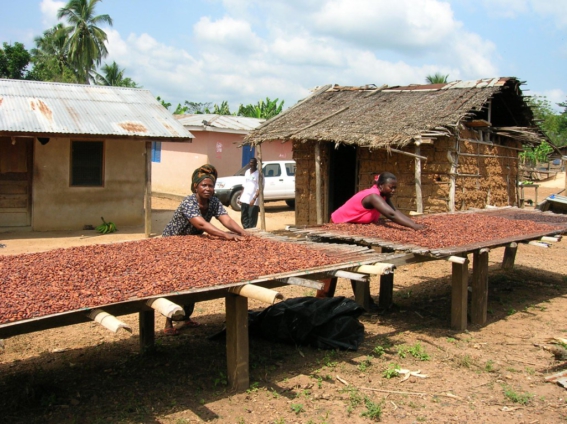Ghana, along with its neighboring cocoa powerhouses, has been grappling with an outbreak of black pod disease—a dreaded menace that causes cocoa pods to blacken and rot.
This has led to a rise in cocoa prices to a 13-year high, leaving farmers and experts grappling with the grim reality of a diminished harvest and compromised bean quality.
The disease has the potential to severely impact both the quality and quantity of cocoa beans produced. Fuad Mohammed Abubakar, the head of Ghana Cocoa Marketing Co., speaking to Bloomberg warned that the disease can prove catastrophic for the cocoa supply.
The leading cocoa-producing countries including Ivory Coast, Ghana and Nigeria, have witnessed a decline in cocoa shipments.

According to reports, Ivory Coast farmers have exported approximately 2.24 million tons of cocoa in the current season, slightly less than the 2.29 million tons recorded the previous year. The situation is causing ripples across the global cocoa market, with concerns about a potential shortage in supply and subsequent price hikes.
Reflecting the challenges faced by the cocoa industry in Ghana and West Africa, cocoa futures in London have soared by over 20% this year. Most-active futures reached £2,544 a ton, a figure not seen since mid-2010. In New York, cocoa futures also climbed 1.7% to $3,412, highlighting the global market's growing concern over the supply situation.
The situation is said to be mainly caused by heavy rainfall across West Africa, which has disrupted the harvest and exacerbated the spread of the black pod disease.
This weather phenomenon, characterized by hot and dry conditions, poses a significant risk to cocoa production.
This worrying trend is fueling fears that the anticipated smaller harvest may not be sufficient to make up for the shortfall experienced during the main crop harvest.
Ghana, alongside other West African nations, relies heavily on the two annual cocoa harvests to sustain its economy and meet global cocoa demands.
Sola Ogunsola, a Nigerian farmer, laments the impact on coastal cocoa farms, where many developing pods have been lost to the disease.
In addition to damaging the crops, the torrential rain has made roads impassable, hindering the transportation of chemicals for plantation treatment and cocoa delivery to ports.
Latest Stories
-
Woman dies after being set on fire on NYC subway
38 minutes -
Elon Musk’s curious fixation with Britain
42 minutes -
EBID wins the Africa Sustainability Award
3 hours -
Expansion Drive: Takoradi Technical University increases faculties
7 hours -
SHS heads demand payment of outstanding funds before reopening of schools
7 hours -
We thank God for the 2024 general elections – Akufo-Addo
8 hours -
Coconut Grove Beach Resort marks 30 years of excellence with memorable 9 lessons & carols service
8 hours -
WAFU B U-17 Girls’ Cup: Black Maidens beat Nigeria on penalties to win inaugral tournament
9 hours -
Real Madrid beat Sevilla to keep pressure on leaders Atletico
10 hours -
Liverpool put six past Spurs to go four points clear
10 hours -
Manchester United lose 3-0 at home to Bournemouth yet again
10 hours -
CHAN 2024Q: ‘It’s still an open game’ – Didi on Ghana’s draw with Nigeria
10 hours -
CHAN 2024Q: Ghana’s Black Galaxies held by Nigeria in first-leg tie
11 hours -
Dr Nduom hopeful defunct GN bank will be restored under Mahama administration
11 hours -
Bridget Bonnie celebrates NDC Victory, champions hope for women and youth
12 hours

